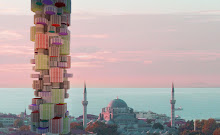I was in Cairo, Egypt on election night. With the significant time difference, I lay in bed at the Nile Hilton, eyes glued to the small television screen in the wee hours of the morning of November 5th, waiting for the state by state returns. When Ohio was called for Obama, as the sun was about to rise over Egypt, I turned off the television to get some sleep, now certain of an Obama victory. I missed all the dancing in the streets back home in the U.S., but I did walk around that day with an extra bounce in my step despite my sleep deprivation.
The following morning, the main paper in Egypt, Al-Ahram had this headline regarding the American election, "A Dream Come True." Now Egypt is geographically far and removed from the United States and the majority of Egyptians struggle daily to barely sustain their families; but despite the difficulties of everyday life, the Egyptians are a very generous and animated people, full of good humor and chatter; and many Egyptians while disillusioned with their own country, all wanted to talk to me about Barack Obama as the next president of the United States. Prior to the election, the young Egyptian kids at the souq or marketplace in Aswan all cheered when I responded that I was supporter of Barack Obama.
On my way back home, stopping over in France, I noticed that the excitement was even more heightened. Every French magazine, every newspaper had Obama on their front covers for months prior to the election. It almost seemed that Obama was running for president of France. And then after Obama's win on November 5th, my sister and her friends in England, some American, some not, all celebrated together.
The New York Times yesterday broke the story that Obama is considering delivering a policy speech the first 100 days of his presidency in an Islamic capital. Cairo presently, seems to be a likely option. I think this is an intriguing idea and if organized in a thoughtful manner could have far-reaching implications. The strategy of speaking directly to the people on the streets instead of through the filters of propped up corrupt dictators is a powerful one. Barack Obama has captured the world's imagination and if he continues to tread carefully and purposefully, he can continue to heal divides and shift narrow perceptions. His life experiences has made him more aware of his role and responsibility as a global citizen. Yet it cannot be overlooked that he must sustain a delicate balancing act internationally when he, as president has to maneuver between his roles and responsibilities as as a fellow citizen of the world and as the enforcer of American interests globally. But of all the American presidents who had to walk that fine line, I would definitely prefer one who is mixed-race, and who had Kenyan father, an internationally-minded mother from Kansas, an Indonesian step-father; and who grew up in Indonesia and Hawaii and was raised by his white grandparents and has a sister who is half Indonesian, half white American and a brother-in-law who is Chinese Canadian.
It is an extraordinary feeling to be united globally in the hope and desire for a better tomorrow. When I finally returned to the U.S. after my travels, I could not deny the exhilaration I felt exiting the airport in Los Angeles. This was not the same place I had left. I returned to find a different, transcendental, more hopeful America. For the first time in eight years, it felt good to be home.
American Newspapers - Headlines of Obama's Won
International Newspapers on Obama's win
America Inc Needs to Get Smart
Financial Times - November 22, 2008
By Tyler Brule
My Chance Encounter with Obama in Hawaii
Time Magazine - November 5, 2008
By Pico Iyer
(For the full article, click on the title above. The abbreviated article is below).
...Everywhere I've been this year — from Jerusalem to Japan to Colombia to Italy and back again — I've heard people essentially say that America is an overweight, white plutocrat who is not only out of touch with the world but also shows no signs of wanting to grow closer to it. This is as unfair as any image — contradicted at every moment by the kindness and curiosity of many Americans — but it remains a potent one in a world where people communicate more with images than ideas and assumptions travel faster than truths. The best way to begin to correct it is to show the world a leader who can't really say how much he's African or Asian or American or just a product of their mixing in Hawaii. The point is not just that Obama will bring globalism to America; in his name, his face and his issues, he'll bring America back to the globe.
You could, in fact, say it is the questions that he draws from his experience that are as important as any answers he may come up with. How to make a peace between the black and the white inside him (or inside our cities and our country)? How to do right by our relatives in Africa without dishonoring the grandparents from Kansas who raised us? How to bring the modest Muslim school in Java together with Harvard Law School? The questions Obama has been thinking about all his life are the very ones that dominate the world today. And the mounting economic crisis only makes the construction of a wider identity — and conversing across the waters — more urgent, not less so.
Barack Obama the man is sure to disappoint some of the expectations his fans have; any man would, especially in the age of the 24/7 news cycle. But the past and the future that he speaks for are precisely the ones that belong so uniquely to the new century....






























No comments:
Post a Comment